Featured Posts

- Index of Psychological Studies of Presidents and Other Leaders Conducted at the Unit for the Study of Personality in Politics
- The Personality Profile of U.S. Supreme Court Associate Justice Brett Kavanaugh
- The Leadership Style of North Korean Leader Kim Jong-un
- North Korea Threat Assessment: The Psychological Profile of Kim Jong-un
- Russia Threat Assessment: Psychological Profile of Vladimir Putin
- The Personality Profile of 2016 Republican Presidential Candidate Donald Trump
- Donald Trump's Narcissism Is Not the Main Issue
- New Website on the Psychology of Politics
- Unit for the Study of Personality in Politics --- 'Media Tipsheet'
categories

- Afghanistan (228)
- Al Gore (2)
- Amy Klobuchar (4)
- Ayman al-Zawahiri (7)
- Barack Obama (60)
- Ben Carson (2)
- Bernie Sanders (7)
- Beto O'Rourke (3)
- Bill Clinton (4)
- Bob Dole (2)
- Campaign log (109)
- Chris Christie (2)
- Chuck Hagel (7)
- Criminal profiles (8)
- Dick Cheney (11)
- Domestic resistance movements (21)
- Donald Trump (31)
- Economy (33)
- Elizabeth Warren (4)
- Environment (24)
- George H. W. Bush (1)
- George W. Bush (21)
- Hillary Clinton (9)
- Immigration (39)
- Iran (43)
- Iraq (258)
- Jeb Bush (3)
- Joe Biden (13)
- John Edwards (2)
- John Kasich (2)
- John Kerry (1)
- John McCain (7)
- Kamala Harris (5)
- Kim Jong-il (3)
- Kim Jong-un (11)
- Law enforcement (25)
- Libya (18)
- Mahmoud Ahmadinejad (6)
- Marco Rubio (2)
- Michael Bloomberg (1)
- Michele Bachmann (173)
- Mike Pence (3)
- Military casualties (234)
- Missing person cases (37)
- Mitt Romney (13)
- Muqtada al-Sadr (10)
- Muslim Brotherhood (6)
- National security (16)
- Nelson Mandela (4)
- News (5)
- North Korea (36)
- Osama bin Laden (19)
- Pakistan (49)
- Personal log (25)
- Pete Buttigieg (4)
- Presidential candidates (19)
- Religious persecution (11)
- Rick Perry (3)
- Rick Santorum (2)
- Robert Mugabe (2)
- Rudy Giuliani (4)
- Russia (7)
- Sarah Palin (7)
- Scott Walker (2)
- Somalia (20)
- Supreme Court (4)
- Syria (5)
- Ted Cruz (4)
- Terrorism (65)
- Tim Pawlenty (8)
- Tom Horner (14)
- Tributes (40)
- Uncategorized (50)
- Vladimir Putin (4)
- Xi Jinping (2)
- Yemen (24)
Links

archives

- November 2021
- January 2021
- November 2020
- October 2020
- September 2020
- August 2020
- July 2020
- April 2020
- March 2020
- February 2020
- January 2020
- December 2019
- October 2019
- July 2019
- May 2019
- April 2019
- March 2019
- February 2019
- January 2019
- December 2018
- September 2018
- August 2018
- July 2018
- June 2018
- April 2018
- March 2018
- February 2018
- January 2018
- August 2017
- July 2017
- June 2017
- May 2017
- April 2017
- February 2017
- January 2017
- December 2016
- November 2016
- October 2016
- September 2016
- August 2016
- July 2016
- June 2016
- May 2016
- April 2016
- March 2016
- February 2016
- January 2016
- December 2015
- November 2015
- October 2015
- September 2015
- August 2015
- July 2015
- June 2015
- May 2015
- April 2015
- March 2015
- February 2015
- January 2015
- December 2014
- November 2014
- October 2014
- September 2014
- August 2014
- July 2014
- June 2014
- May 2014
- April 2014
- March 2014
- February 2014
- January 2014
- December 2013
- November 2013
- October 2013
- September 2013
- August 2013
- July 2013
- June 2013
- May 2013
- April 2013
- March 2013
- February 2013
- January 2013
- December 2012
- November 2012
- October 2012
- September 2012
- August 2012
- July 2012
- June 2012
- May 2012
- April 2012
- March 2012
- February 2012
- January 2012
- December 2011
- November 2011
- October 2011
- September 2011
- August 2011
- July 2011
- June 2011
- May 2011
- April 2011
- March 2011
- February 2011
- January 2011
- December 2010
- November 2010
- October 2010
- September 2010
- August 2010
- July 2010
- June 2010
- May 2010
- April 2010
- March 2010
- February 2010
- January 2010
- December 2009
- November 2009
- October 2009
- September 2009
- August 2009
- July 2009
- June 2009
- May 2009
- April 2009
- March 2009
- February 2009
- January 2009
- December 2008
- November 2008
- October 2008
- September 2008
- August 2008
- July 2008
meta

Donald Trump’s temperament has emerged as a major campaign issue in the 2016 U.S. presidential election.
Item: According to a Fox News poll conducted after the first presidential debate (Sept. 26), 59 percent of respondents felt Trump lacked the temperament to serve effectively as president, compared with 67 percent saying Clinton had the right temperament. (“Fox News poll: Clinton ahead of Trump after debate, fear motivating both sides†by Dana Blanton, FoxNews.com, Sept. 30, 2016)
Item: “By about two-to-one, voters say that their recent conversations about the election have been more about the candidates’ personalities and comments (59%) than about specific issues or policy positions (32%),†according to a Pew Research Center survey conducted June 7-July 5, 2016. (“Few Clinton or Trump supporters have close friends in the other camp†by Pew Research Center, August 3, 2016)
Item: “Most voters consider Donald J. Trump a risky choice for president, saying he lacks the right temperament and values,†with Hillary Clinton seen as a safer option, according to a Sept. 13-16 New York Times/CBS News poll. (“Voters’ view of a Donald Trump presidency: Big risks and rewards†by Patrick Healy and Dalia Sussman, Sept. 15, 2016)
Of course, it’s unlikely most poll respondents have an accurate understanding of the technical meaning of the term temperament. Considering the frequency with which the word is pronounced “temperment,†it’s likely many, if not most, voters understand temperament to refer primarily to a person’s temper – in other words, being irritable and prone to outbursts of anger (i.e., how easily someone flies off the handle), as opposed to having a calm, patient disposition.
The real meaning of temperament
Technically, temperament refers to behaviors linked with emotionality (positive vs. negative affect, the optimism–pessimism dimension) and arousability (passivity vs. activity, a low–high-energy dimension). Moreover, temperament emerges very early in life and is likely to have a heritable (inborn) basis.
A simplified explanation, paraphrasing psychologist Theodore Millon, would be that temperament refers to a person’s typical manner of displaying emotion and the predominant character of an individual’s affect (i.e., emotion), and the intensity and frequency with which he or she expresses it.
In practical terms, temperament shares much in common with the notion of “emotional intelligence,†which refers to the ability to recognize and understand one’s own emotions and those of others, and to manage one’s own emotions and influence those of others. This capacity for emotional awareness, empathy, and skillful interpersonal relationships is a critical ingredient of effective leadership.
Trump’s personality profile
An empirical study of Trump conducted at the Unit for the Study of Personality in Politics between June 2015 and August 2016, revealed that Trump’s predominant personality patterns are Outgoing/impulsive and Ambitious/exploitative (a measure of narcissism), infused with secondary features of the Dominant/controlling pattern.
Following is an outline of temperamental features of the personality patterns most centrally involved in driving Trump’s political behavior, based on Millon’s (1996) model of personality.
Outgoing (histrionic) pattern: Poor impulse control
Temperamentally, outgoing individuals are emotionally expressive; they are animated, uninhibited, and affectively (emotionally) responsive. Their moods can change quickly, with occasional displays of short‑lived and superficial moods. From a political leadership perspective, the attendant risk is that highly outgoing personalities are predisposed to impulsive actions; they may be over-excitable, capricious, and exhibit a pervasive tendency to be easily enthused and as easily bored or angered, leading to thoughtless, imprudent judgments and rash, even reckless courses of action.
Ambitious (narcissistic) pattern: Knee-jerk response to criticism
Temperamentally, narcissistic individuals are socially poised; at their best they are self-confident, optimistic, and cool and levelheaded under pressure. Though appearing carefree; nonchalant, and debonair, their blind spot is to respond reflexively to personal criticism with annoyance, rage, or anger.
Dominant (aggressive) pattern: Lacking in empathy
Temperamentally, dominant individuals are irritable; they have an excitable temper that they may at times find difficult to control. They tend to be lacking in empathy and are disinclined to experience and express warm feelings, complemented by a volatile temper that flares readily into contentious argument.
Political implications
Regarding the relationship between temper (narrowly defined as one component of temperament) and leadership, political scientist Stanley Renshon, in his 1996 book The Psychological Assessment of Presidential Candidates, asserted that its political implications hinges on five critical questions.
- Are the temper outbursts occasional or regular?
- Are there particular issues that set off the displays of temper?
- Does the candidate easily recover from angry episodes, or does he nurse grudges?
- Does the candidate berate or belittle those unlikely or unable to retaliate?
- Is the candidate aware of, and does he try to control his temper?
To the extent that outbursts of temper (1) occur regularly; (2) are set off by a broad range of issues; (3) prompt grudges that the candidate cannot let go of; (4) are directed at individuals unlikely or unable to retaliate; and (5) are poorly controlled by a candidate who appears to lack insight, the determination may be made that the candidate is unfit to govern.
Trump’s temperament, beyond its less admirable aspects, also embodies passion and straight-shooting candor. But whatever the deeper meaning and political implications of an unruly temper – character, personality, and temperament are legitimate public issues in determining a presidential candidate’s fitness to lead.
References
Millon, T. (1996). Disorders of Personality: DSM-IV and Beyond (2nd ed.). New York: Wiley.
Renshon, S. A. (1996). The Psychological Assessment of Presidential Candidates. New York: New York University Press.
As published: “A question of temperament: Donald Trump’s fitness to lead”
“Trump’s personality raises red flags” by Aubrey Immelman (St. Cloud Times, Nov. 27, 2016) » http://www.sctimes.com/story/opinion/2016/11/26/trumps-personality-raises-red-flags/94335366/
More » The Political Personality of 2016 Republican Presidential Nominee Donald J. Trump. Working paper, Unit for the Study of Personality in Politics, St. John’s University/College of St. Benedict, October 2016. Abstract and link for full-text (31 pages; PDF) download at Digital Commons: http://digitalcommons.csbsju.edu/psychology_pubs/103/
For more information, please consult the Unit for the Study of Personality in Politics Media Tipsheet at http://personality-politics.org/2016-election-media-tipsheet/
Related reports on this site
The Personality Profile of 2016 Republican Presidential Candidate Donald Trump (Aug. 9, 2015)
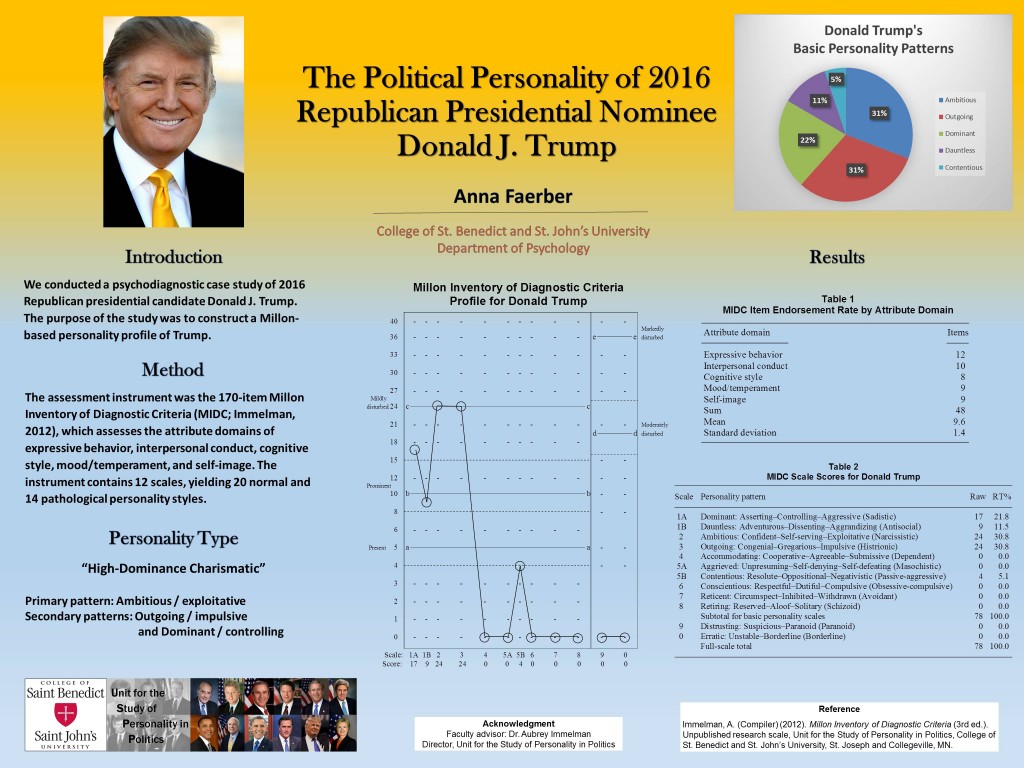
Click on image for larger view
Projecting the Winner of the 2016 Presidential Election: The Personal Electability Index (Feb. 29, 2016)
Donald Trump’s Narcissism Is Not the Main Issue (Aug. 11, 2016)
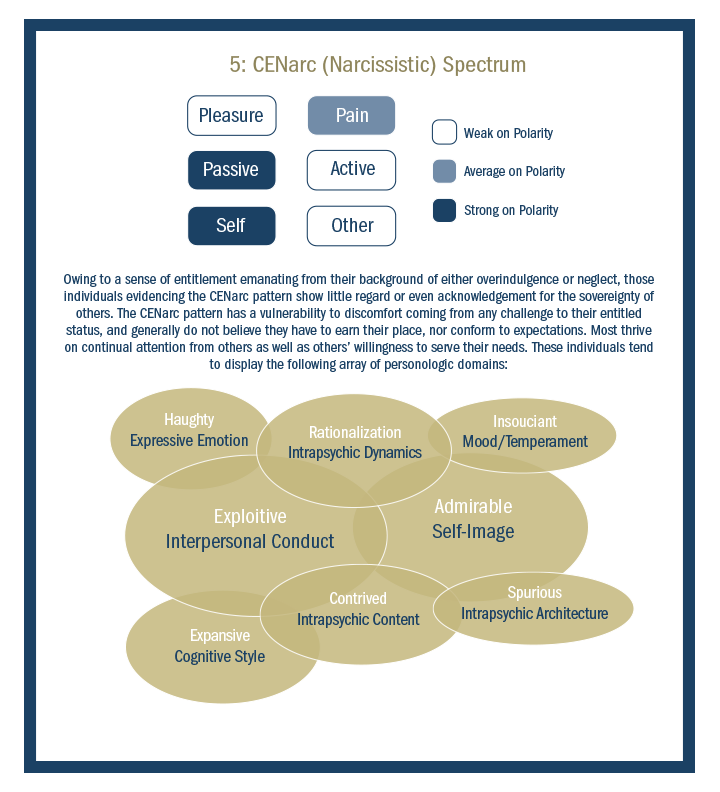
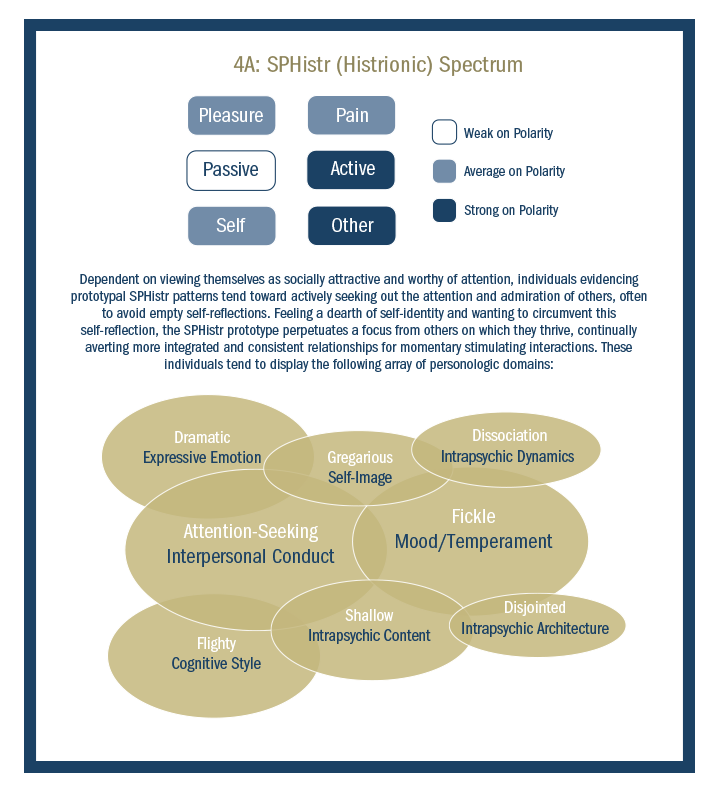
© 2015 MILLON®                                          (Click on images for larger view)
Leave a Reply
You must be logged in to post a comment.

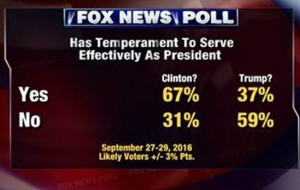
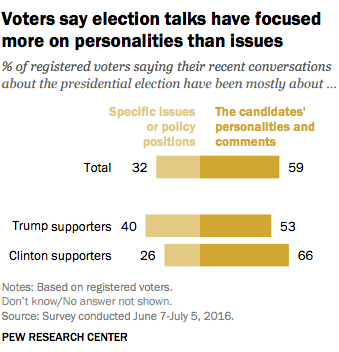
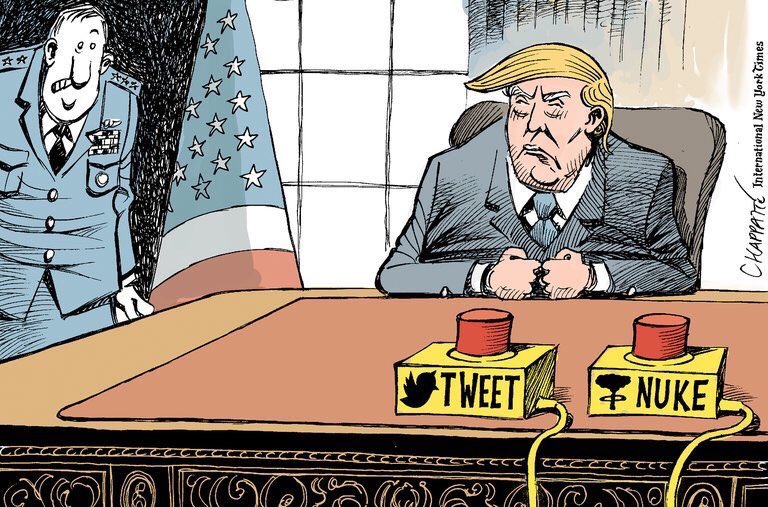
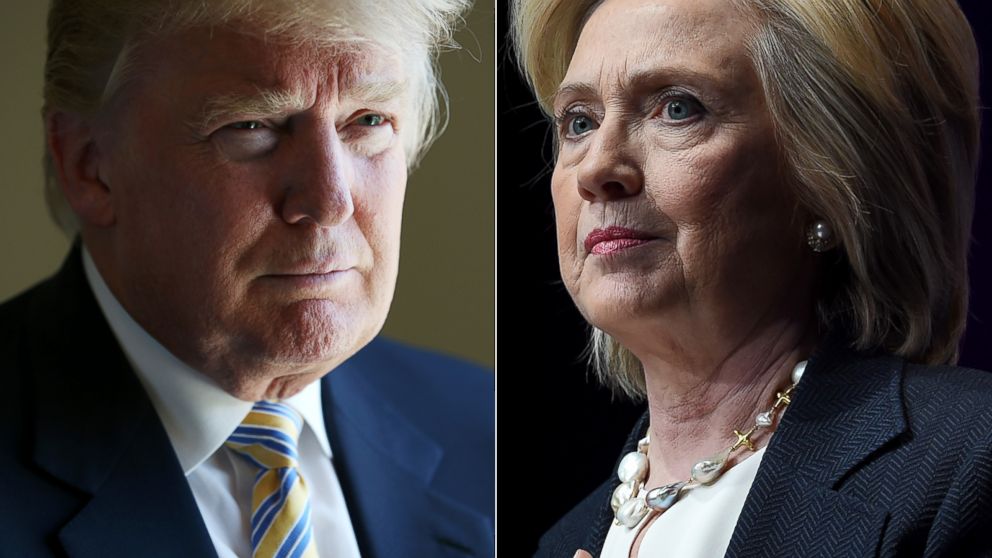

October 8th, 2016 at 7:58 pm
[…] Donald Trump’s Temperament: Trump’s Fitness to be President (Oct. 5, 2016) […]
November 4th, 2016 at 4:58 am
[…] Donald Trump’s Temperament: Trump’s Fitness to be President (Oct. 5, 2016) […]
November 13th, 2016 at 7:42 am
Cross-posted from “No one has a clue what kind of president Donald Trump will be†(Dan Balz, Washington Post, Nov. 12, 2016) at https://www.washingtonpost.com/politics/no-one-has-a-clue-what-kind-of-president-donald-trump-will-be/2016/11/12/5c05b192-a8e7-11e6-8fc0-7be8f848c492_story.html
From the article: “One big question ahead is which Donald Trump will emerge after Inauguration Day. Will it be the bombastic Trump of the campaign? … Or will it be the more temperate, subdued and inclusive-sounding Trump? …â€
As a political psychologist, my primary concern regarding Donald Trump leadership prospects is his temperament — that is, behaviors linked with emotionality and arousability.
In practical terms, temperament is akin to the notion of “emotional intelligence,†which refers to the ability to recognize and understand one’s own emotions and those of others, and to manage one’s own emotions and influence those of others. This capacity for emotional awareness, empathy, and skillful interpersonal relationships is a critical ingredient of effective leadership.
Fit to lead? The temperament of Donald J. Trump » http://www.immelman.us/news/donald-trumps-temperament-trumps-fitness-to-be-president/
December 4th, 2016 at 12:02 am
[…] Donald Trump’s Temperament: Trump’s Fitness to be President (Oct. 5, 2016) […]
January 24th, 2017 at 2:24 am
[…] Donald Trump’s Temperament: Trump’s Fitness to be President (Oct. 5, 2016) […]
January 8th, 2021 at 2:23 pm
[…] If indeed the president is psychologically so unstable as to pose an imminent threat to public safety and social order, making him feel cornered and under siege would magnify, not mitigate, the potential threat. […]